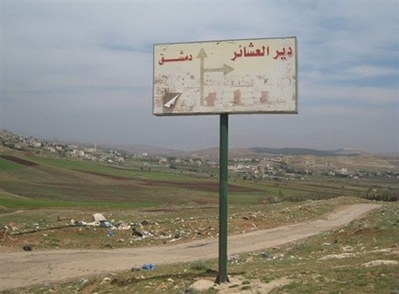 by Rita Daou, AYHA, Lebanon (AFP) - As night falls on remote villages in eastern Lebanon that border Syria streets and alleyways bustle into life as a small army of pick-up trucks, mules and cars are readied for action. Loaded up with whisky, bread, metal and other goods, drivers head for the dirt roads that zig-zag through nearby hillsides and valleys to deliver loads to fellow smugglers across the border before returning with staples such as heating oil, laundry detergent and vegetables.
by Rita Daou, AYHA, Lebanon (AFP) - As night falls on remote villages in eastern Lebanon that border Syria streets and alleyways bustle into life as a small army of pick-up trucks, mules and cars are readied for action. Loaded up with whisky, bread, metal and other goods, drivers head for the dirt roads that zig-zag through nearby hillsides and valleys to deliver loads to fellow smugglers across the border before returning with staples such as heating oil, laundry detergent and vegetables."We work from around 9:00pm until dawn," said one 46-year-old smuggler who asked to be identified only by his initials of M.Z. "We leave home in our pick-ups, cars and even mules loaded with alcohol and other products." M.Z., who has plied the trade for decades, said smugglers from both sides have specific meeting points along the mountainous border. "Once we get to a meeting place we wait for Syrian vehicles loaded with products and we make the exchange very quickly," he added.
Smuggling between Lebanon and Syria goes back to when both countries became independent in the 1940s, sharing a 170-kilometre (105-mile) long border that has never been officially delineated. "The Lebanese economy has depended on a parallel economy for ages," said Fares Ishtay, political science professor at Lebanese University. "Salaries in both countries are very low and people depend on undeclared goods to survive." He said that although hashish used to be the main contraband, other products, not considered illegal as such, have now become hot items.
Following the 15-year civil war that ended in 1990, successive Lebanese governments have come under international pressure to tackle smuggling -- especially of drugs and weapons -- but have met with little success.
Many villages near Syria depend on smuggling for survival as locals often live below the poverty line and have few resources. Some villages do not have shops or bakeries.
Villagers, some of them children, risk their lives daily going back and forth to smuggle heating oil, household goods and food.
"My uncle who has four children was shot by Syrian border guards in 1993 as he was smuggling items near his village of Al-Suweira," said Hala, 25, who asked that her last name not be used.
"He had just delivered sugar and ceramic tiles to Syria and was killed on his way back."
She said 90 percent of people in Al-Suweira depended at one time on smuggling to survive, but added that their numbers have shrunk in recent years as many emigrated to Canada or Brazil.
Villagers in Yantak, Ayha, Kafr Quq and Al-Suweira, all with a majority Druze or Sunni Muslim population, shrug their shoulders when asked about the illegal trade. They do not deny it is taking place, however.
In Yanta, new homes built of thick white stone stand ready for their owners but the village still resembles a ghost town.
"Nearly 80 percent of the locals now live in Edmonton, Canada," said Kamel Ammar, 71, whose sons and brothers are among the emigres. "People need to make a living -- so they left."
Shepherd Mahmud Ishtay, 18, said his family of nine depends on mazut -- heating oil -- from Syria to stay warm during the winter months.
A jerrycan of 20 litres (5.2 gallons) costs 20 dollars (12.7 euros) in Lebanon as opposed to just three dollars in Syria, where heating oil is subsidised by the state.
In a bid to crack down, the Syrian government in March began imposing a special tax on trucks that leave Syrian territory loaded with mazut.
Authorities also place special seals on vehicles that deliver goods in a bid to ensure they are not used for smuggling.
But the traffickers still manage to come up with ingenuous ways to get their merchandise across the border.
Standing on the roof of his home facing a chain of mountains, M.Z. points to the Kussaya region to the west.
"Over there you have plastic tubes up to 10 centimetres (four inches) wide that run from the top of the mountain to the valley below," he said with a mischievous look.
"Every night we go there to fill jerrycans with mazut sent by the Syrian smugglers."
A senior Lebanese security official admitted to AFP that smuggling between the two countries was widespread.
He said controlling the frontier was essential to stop weapons and armed elements from entering the country, and said the issue has become even more pressing since Syrian troops withdrew in 2005 following a 29-year presence.